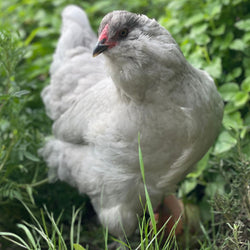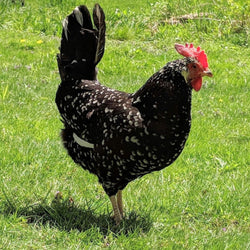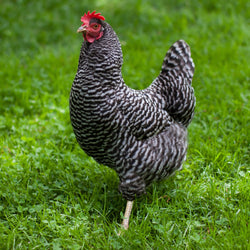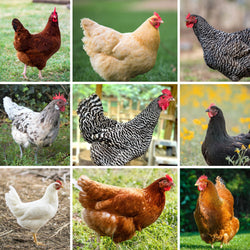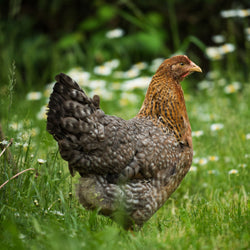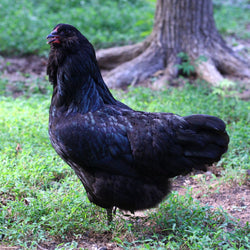f=menu&page=23/--
Frequently Asked Questions
Here we answer the most commonly-asked questions about ordering, chicken care, and more.
Can I keep ducks, turkeys or other types of fowl with my chickens?
There are challenges associated with mixing fowl varieties, such as making sure each one eats the right food for their needs. Often different fowl have different nutritional requirements, so sometimes they won't be healthy if they all eat the same food. Will you offer them all layer feed for chickens, feed designed for your other fowl, or something else entirely that is a compromise between the two? It may be hard to find something they can all eat that will keep them all at their best when their care needs are so different. Ducks, geese, guineas, peafowl, quail, pheasants, turkeys...
Read MoreWhat do I need to know about wolves and coyotes if I keep chickens?
Name: Wolf, Coyote Canis lupus, Canis latrans Description: Wolves and coyotes are both members of the dog family, and appear as large (scary!) dogs with silvery or brownish fur. Wolves can be up to 5 feet long (excluding tails), and nearly three feet tall at the shoulder. They can weigh up to 175 pounds, but average around 80. Coyotes can be up to about 3 feet long (excluding the tail), and about 2 feet tall at the shoulder. They can weigh up to 75 pounds, but average around 50. Distribution/Habitat: Coyotes are found in North America. Various species of wolves...
Read MoreWill my dog attack chickens?
Domestic dogs--including those belonging to you as well as those belonging to other people--are the most common predators of chickens in both suburban and rural areas. Most dogs are not trying to kill your birds. They simply want to chase, but even chasing can be fatal, because chickens often break their necks trying to get away, or die of heart attacks if they have no where safe to escape. In cases where your chickens are neither hurt nor killed by a dog attack, they can still be thrown off laying for days or even several weeks due to the upset....
Read MoreWhat do I need to know about raccoons if I keep chickens?
If you keep chickens, you need to know that raccoons will absolutely prey on your flock if given the opportunity. To keep your flock safe, you need to make sure you outsmart them using the tips you'll find below. With their black masks adding to their reputation as scoundrels, raccoons can be up to 30 inches long and weigh up to 20 pounds. As such, without your help, chickens are no match for them. Raccoons may very well be the number one land predator of chickens in the United States. The can be found almost everywhere in North America, as...
Read MoreWhat do I need to know about snakes if I keep chickens?
Name: Snakes Serpentes spp (nearly 3000 species) Description: *Legless reptiles of many colors *Snakes range in size from just a few inches/a few ounces to those that are more than 25 feet long and more than 200 pounds Distribution/Habitat: Various species are found throughout the world Hunting Behavior: Most snakes too small to be predators of adult chickens. Instead, they tend to be predators of eggs and young chicks. (The largest snakes are inhabitants of rain forests, and we suspect that very few backyard chicken keepers will live in the Indian or South American jungles.) Very small snakes won't even...
Read MoreWhat do I need to know about weasel family predators if I keep chickens?
Name: Weasel, ermine, ferret, mink, badger, fisher, ermine, wolverine, skunk, etc. Mustelidae and Mephitidae spp Description: This group contains diverse predators including those listed above. Those species interested in preying on your chickens generally are small to medium, long-bodied, short-legged omnivorous mammals. Some are tiny; for instance, some weasels aren't much bigger than a mouse, but they can kill rabbits and chickens many times their size. Some members of this group are very large; for instance, wolverines have weighed up to 70 pounds. Distribution/Habitat: Various species are found throughout the world Hunting Behavior: Some in this group are not predators...
Read MoreWhat do I need to know about foxes if I keep chickens?
Name: Fox Vulpes spp. Description: *Many different species of reddish or greyish, dog-like mammals with long bushy tails *Up to 3 feet long (excluding tails, which may add another 2 feet), and weighing up to 22 lbs average (record is 26.5 pounds) Distribution/Habitat: Various species are found throughout the world Hunting Behavior: Foxes will not appear in suburban settings as often as raccoons or opossums, but they are still a danger. They will normally stake out your coop beforehand so they know when to strike, grab a bird, and how to get away fast. If they get inside an enclosed...
Read MoreWhat do I need to know about house cats if I keep chickens?
Domestic house cats very rarely attack adult chickens, but they can be a serious danger to baby chicks, and occasionally to juvenile birds or small bantams. That said, not all are, to be sure. With chicks, it's better safe than sorry, but there are plenty of examples on the interwebs of cats cuddling and loving on baby chicks, like the above. Occasionally we do hear from people whose cats seem interested in their adult birds. Since many of the most common chickens are just as big as house cats, this is pretty rare. If a cat kills an adult chicken...
Read More







"The Clubhouse" Coop
Easy to assemble and built to last, the Clubhouse Coop is the perfect starter coop for a small flock.

